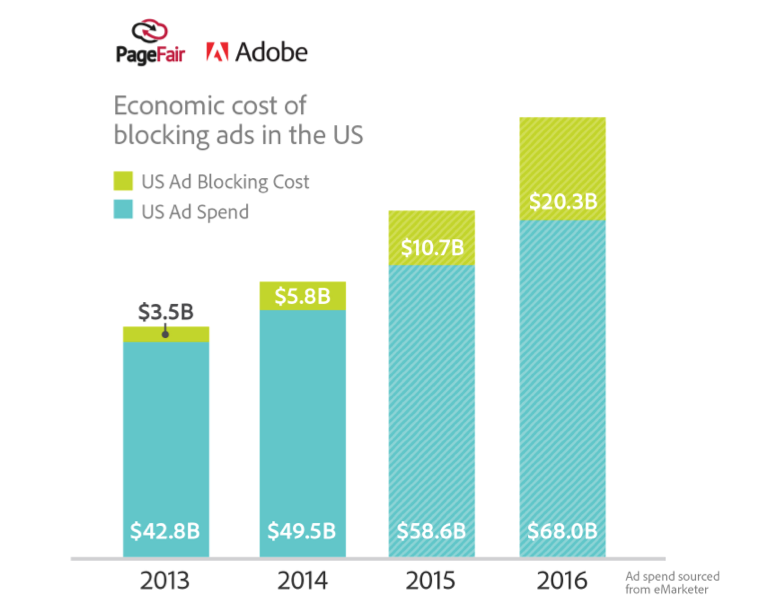Ad Blockers Will Prevent You From Seeing $22B Worth Of Unwanted Ads This Year

In the U.S. alone, the report figures that nearly $11 billion in online ad revenue will be lost this year because of ad-blocking technology.
That’s according to a report [PDF] from Adobe and PageFair, who put this year’s total at nearly double the 2014 losses of $11.7 billion. The companies project that the figure will almost double again and reach more than $41 billion next year.
The U.S. is responsible for about half of the lost revenue, at $10.7 billion for 2015, up from $5.8 billion last year. By next year, stateside ad-blocking will be taking more than $20 billion out of websites’ pockets, according to the report.
(This is where we remind you that Consumerist does not, and will not, accept advertising so we have no financial interest in the success of failure of ad-blocking technology.)
In terms of the content with the most frequently blocked ads, the report finds that sites related to gaming have by far the most visitors likely to block advertising content, followed by social media sites, tech/Internet-themed sites, education, and then sports. At the other end of the spectrum are government/legal sites, where ad-blocking consumers don’t often go.
Though ad-blocking on Safari saw the highest rate of increase (71%), that increase still only brought up to 9 million users the number of Safari folks deploying ad-blocking tech. Compare that to Chrome, which now has some 126 million users blocking ads, an increase of 51% from the same time last year.
Interestingly, while the use of mobile devices for web-browsing has increased significantly in recent years, ad blocking is virtually unheard of, with only 2% of mobile users employing an ad blocker. The report notes that this could change with the upcoming release of iOS 9, as iPhone users will be more easily able to obtain and use ad-blocking apps.
The Internet’s ability to track ad views (and clicks, and sell-throughs, and more) is undoubtedly a huge innovation over traditional advertising and its vague accounting.
On TV or radio, an advertiser might know how many viewers a show has, but they don’t know if these people are turning down the volume or leaving the room during commercial breaks. And print advertising is a crap shoot, hoping that enough people pick up a magazine or newspaper and come across your ad.
Online advertisers know more precisely how many times their message was seen, where it was seen, and whether people cared enough to do anything about the ad.
But the fact is that, outside a handful of Super Bowl and Oscar spots, most people don’t like advertising and if you give them an easy way to avoid it, they will. Look at the near-universality of the DVR. TV viewers don’t just like being able to record shows, they like not having to sit through seven minutes of auto insurance ads to find out who Gordon Ramsay is going to yell at.
At the same time, nearly every “free” website you read relies primarily, if not solely, on advertising revenue to remain in existence. If too many visitors start blocking ads, some websites may need to charge for content or find other revenue streams.
Last fall, Google launched its “Contributors” program, which would let people pay money to their favorite sites in exchange for seeing fewer ads, but the model hasn’t exactly caught fire among consumers.
Perhaps the only way to make online advertising more acceptable to concerned consumers is to make it less invasive. The ad in my copy of Vogue doesn’t know anything about me, so why should an ad on Vogue.com know everything about me?
“No matter your views on whose rights trump whose, the economic impact of ad blocking is real and measurable,” says Campbell Foster, Adobe’s Director Product Marketing, in the report.
Want more consumer news? Visit our parent organization, Consumer Reports, for the latest on scams, recalls, and other consumer issues.

